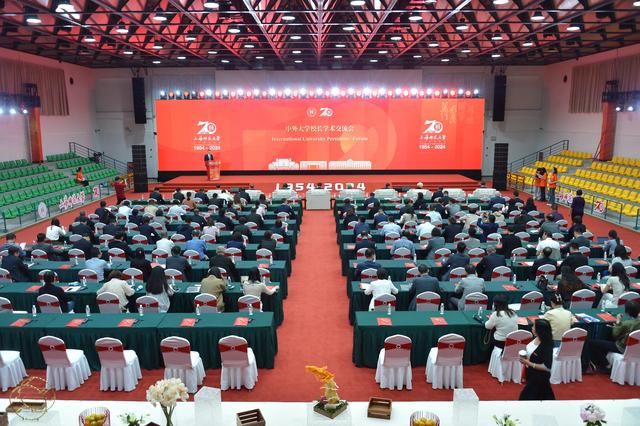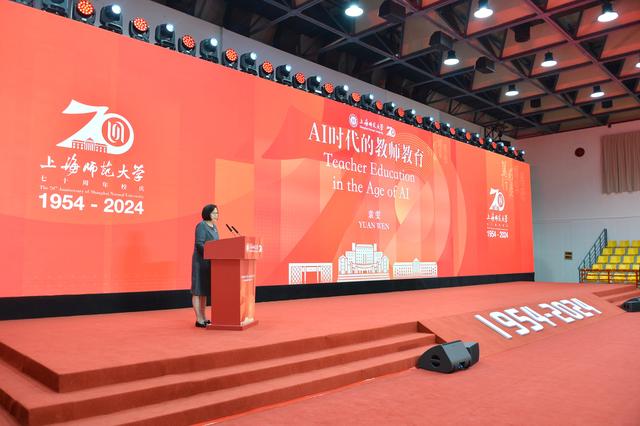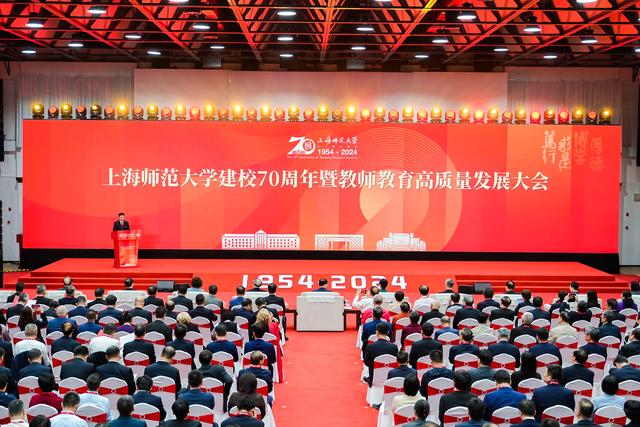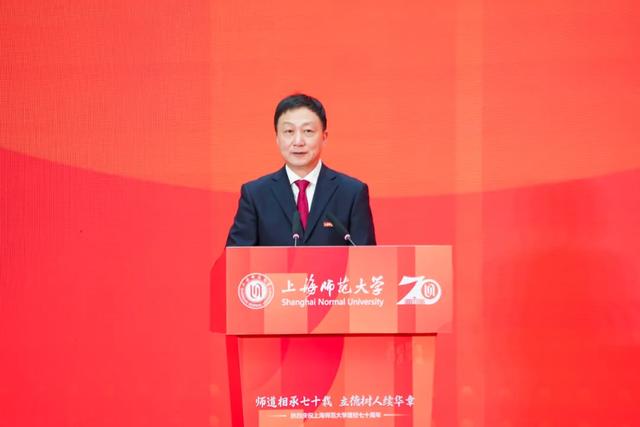
With the widespread use of artificial intelligence (AI) in the education field, homework correction, simple question answering and even the development of personalized learning and tutoring plans can now be realized through machines. Many people have thus asked: In the AI era, is it time for teachers to withdraw from the stage of history?
"In the era of artificial intelligence, do we hand over the future of education to AI, or do we strive to integrate into this profound change and co-evolve with AI? This is a question as important as 'survival or death'." Today (10 July 16) is the 70th anniversary of the founding of Shanghai Normal University. On that day, at the academic exchange meeting between Chinese and foreign university presidents hosted by Shanghai Normal University, Yuan Wen, the president of Shanghai Normal University, made a thought-provoking speech.
Chinese and foreign education experts attending the meeting agreed that AI will assist teachers rather than replace them. At the same time, the entry threshold for teachers and society’s requirements for teachers’ quality will further increase. It is urgent to reform teacher education and cultivate a group of talents with "AI competency".
How do teachers in the "2.0 era" cope with the future?
In the AI era, technological development is surging, but many principals lament that the large number of graduates trained by colleges and universities lags behind actual needs, and their thinking and ability to control AI are still insufficient.
"Why do some big names and entrepreneurs in technology companies leave campus before graduating from college?" At the meeting, Qian Xuhong, president of East China Normal University and academician of the Chinese Academy of Engineering, cited a set of examples: Tesla founder Elon Musk , OpenAI founder Sam Altman, and DJI founder Wang Tao all dropped out of college and are now industry leaders.
"This has to make people reflect on whether college education provides free and sufficient development space for students with top innovation potential." Qian Xuhong further asked, "In the era of rapid development of artificial intelligence, only the talents cultivated by colleges and universities can meet the needs of society. Need it?"
In his view, the industry has now entered the 4.0 stage, but today, quite a few universities are still cultivating stage 2.0 talents. If university education produces teachers for the 2.0 era, how will they cope with the future? In order to cultivate talents that cannot be replaced by AI, the education model must be changed.
At East China Normal University, an education and teaching reform with "overlimit" as the key word has begun. Currently, the school is implementing the "Digital Intelligence Leap" plan to allow students to learn to control AI tools and hone their critical thinking skills. The school is also promoting changes in scientific research paradigms, using AI to discover information and create knowledge from data, and has developed scientific research tools such as the "Digital Intelligence Qihuang" large model of traditional Chinese medicine and the large model ChemGPT in the field of chemistry. The school has also opened 163 general courses covering science and technology, humanities, and art, aiming to cultivate cross-border talents with one specialty and multiple abilities.
How to lead the new style of education and teaching in the AI era
"Cultivating teachers with 'AI competency' is the most urgent task in the current teacher education reform, and the key is the reform of training programs." Yuan Wen said that in the past, teacher education courses were often criticized for being outdated in content and too long in class time. Long and lacking practical value. At the same time, in the past, the development of training programs for some teacher majors has not answered a question well: What are the differences between the courses that normal students and non-normal students need to learn?

"The usual answer is 'common general courses and subject courses + teacher education courses + educational practice'. But the consequence of this is that normal students may have taken more courses, but have not gained better general literacy and subject foundation. "Teacher education courses and practical courses are also ineffective," Yuan Wen said, "The arrival of the AI era makes it possible for us to comprehensively update the curriculum for normal school students so that normal school students can better adapt to and lead the AI era. A new look in education and teaching.”
It is reported that Shanghai Normal University has established a general course for normal students called "Artificial Intelligence and Education", which is not only open to normal students, but also to teachers who are unfamiliar with the teaching theory of the subject. This "teachers and students train together" approach aims to encourage teachers with subject teaching theories to actively integrate their subject teaching knowledge with AI. At the same time, Shanghai Normal University has established demand-oriented teacher education AI courses and established an intelligent training platform for normal students to create real and diverse virtual teaching scenarios for normal students and improve their teaching capabilities and adaptability.
How to provide teachers with more lifelong learning opportunities
Many university presidents also said that teachers in the future should pay more and more conscious attention to their own professional construction, pay attention to the "knowledge production" ability in addition to "knowledge transfer" and the "exploration" ability in addition to "teaching", and become lifelong learning. who.
"The development of science and technology can both be a booster of educational progress and an amplifier of educational gaps. There is no doubt that the AI era has higher requirements for teacher quality." Andrea, Advisor to the Secretary-General of the Organization for Economic Cooperation and Development Schleicher particularly emphasized that to attract more outstanding people to teach, increasing salaries and benefits is only one of the means, and it is crucial to enhance teachers' sense of professional achievement and identity.
"In order for teachers to have confidence in their professional development, a key point is to provide teachers with effective and continuous professional development programs and provide teachers with lifelong learning opportunities." He said that Shanghai has always been a global leader in the digital transformation of education. leader. With the further development of AI, Shanghai should make good use of existing digital resources and provide teachers with richer development opportunities.
In Yuan Wen's view, in the AI era, teachers becoming lifelong learners has become an unprecedentedly important issue. “Lifelong learning has become a basic requirement for being a qualified teacher.” Fang Yonghao, Vice President of the Education University of Hong Kong, also feels the same way. In his view, teachers in the future will not only be supervisors and correctors of machine teaching, but also diagnosers of students' psychological problems, transmitters of teachers and students' emotions, and coordinators of human-machine collaborative teaching models. To this end, teachers must keep learning and constantly grow in their wisdom in using technology. The Education University of Hong Kong has launched computational thinking and programming education in 2016, providing hundreds of teachers with the necessary courses for coding education. After the course was launched, the Education University of Hong Kong conducted a survey among 13,000 students in grades four to six from about 50 schools. "The results show that this initiative is effective and provides a valuable demonstration for Hong Kong's programming and coding education." Fang Yonghao said.

It is reported that this event is one of a series of activities celebrating the 70th anniversary of the founding of Shanghai Normal University.
Shanghai Normal University was founded in 1954. It is a key university in Shanghai. It is a comprehensive university that specializes in liberal arts and coordinates the development of liberal arts, science, engineering, art and other disciplines with teacher education characteristics. It will enter Shanghai's high-level local universities in 2021 There are currently about 44,000 students of various types in the construction process.
As an excellent teacher training institution for the whole school period of the Ministry of Education, Shanghai Normal University has provided a large number of outstanding teachers to Shanghai’s basic education front. More than 50% of Shanghai’s education heroes, Shanghai’s teaching and educating models, Shanghai’s special principals and senior teachers are teachers. University alumni.

"We are the first university established in Shanghai by the Communist Party of China, the People's Government and the people after the founding of the People's Republic of China. As we are currently thinking about how to develop a people's city, we can summarize some of the 'people's cities for the people' from the history of running schools. experience." Lin Zaiyong, Secretary of the Party Committee of Shanghai Normal University, said at today's 70th anniversary of the founding of Shanghai Normal University and the high-quality development conference of teacher education.